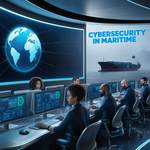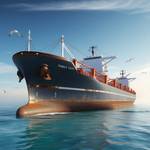Ship Repair
All ships need maintenance and repairs. Many repair and maintanance operations can be performed at sea or by the crew in port. Complicated or large-scale repairs might require the ship to be removed from commercial operation. Classification Society supervision is required for most large-scale repairs, particularly those carried out in a ship repair yard. For oceangoing ships, particularly tankers, the ship has to be prepared for repair at a Deballasting Station. The tank must be thoroughly cleaned and its slops (grey water and hydrocarbon residues) must be pumped ashore according to environmental regulations.

Global Shippers Await Word on US Port Fees for China-Linked Vessels
The U.S. Trade office will this week announce its plan for levying port fees on China…

Seaspan Boosts Investment in Automated Welding Technology
Seaspan Shipyards has announced a $5 million investment in Novarc Technologies Inc.…

U.S. Navy Needs to Rethink Private Sector Industrial Base Investments
The U.S. Government Accountability Office (GAO) has published a report indicating…

SCA’s Paxton Testifies to Congress on Bolstering U.S. Shipbuilding Base
[The following are exerpts and paraphrasing from testimony given by Matthew O. Paxton…

Maersk Partners With Cochin Shipyard
A.P. Moller - Maersk and Cochin Shipyard Limited (CSL) have signed a Memorandum of…

Dales Marine Services Appoints McLean
Dales Marine Services (DMS) appointed Euan McLean as its new Business Development Manager.

Japanese Firms Use Laser Tech for Rust and Coating Removal from Vessels
Mitsui O.S.K. Lines (MOL), MOL Drybulk, Furukawa Electric, and Tsuneishi Shipbuilding…

BAE Systems Ship Repair Begins Making Submarine Components
BAE Systems won a contract by General Dynamics Electric Boat for deck module fabrication…

Interview: Lane Richards, Everett Ship Repair
Lane Richards has worked in the maritime industry for 22 years. He began his career…

Floating Dock Set to Position Takoradi as Ship Repair Hub
Specialist provider of offshore support services, Interocean Marine Services is supporting…

Alabama Shipyard to Repair USACE's Largest Hopper Dredge Wheeler
Mobile, Ala. ship repair yard Alabama Shipyard has been awarded a contract to repair the U.S.

Titan Taps Francesco Valente to Succeed Jim Marcotuli as CEO
Titan, a ship repair and fabrication company with yards on the U.S. West and East Coasts…
The maritime piracy menace is an old one, but it continues to be a significant threat to the global trade and security of the seas. Piracy is a major challenge today, despite concerted efforts by international organizations to combat this illegal activity. New developments and persistent threats are shaping the current landscape.
Maritime piracy in Southeast Asia has been a persistent and complex issue with deep historical roots and contemporary relevance. This region, characterized by its extensive coastal areas, strategic maritime routes, and bustling trade activities, has frequently been targeted by pirates. The issue of piracy in Southeast Asia presents economic, security, and governance challenges that require regional cooperation and coordinated efforts.
Naval architecture is the field of engineering which deals with the design, construction and repair of ships, boats, and other marine vehicles. Ship and vessel design relies on many of the same technologies and engineering expertise found on shore…

As the maritime industry undergoes a digital transformation, the integration of advanced technologies such as automation, Internet of Things (IoT), and big data is revolutionizing operations. However, this digital shift also brings significant risks, particularly in the realm of cybersecurity. Protecting maritime assets, systems, and data from cyber threats has become a critical priority as the industry becomes more connected and reliant on digital infrastructure.

Tanker ships are an important component of the maritime sector, and they transport liquid cargoes around the world. These vessels are vital to the supply chain for energy, chemicals and other essential commodities. There are many types of tankers, each designed for specific cargoes such as oil, LNG, chemicals, or other liquids.













